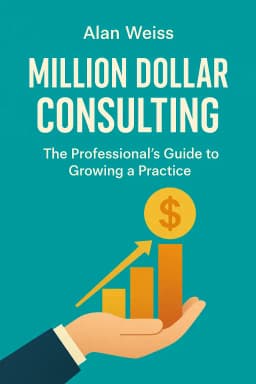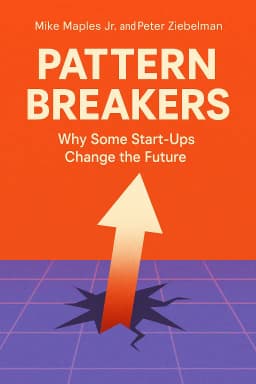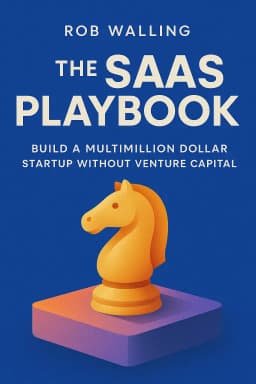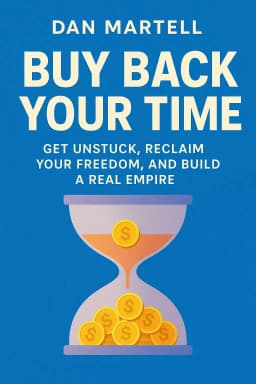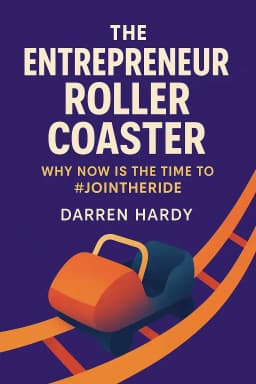
The Art of Failing Up
Why Now Is the Time to #JoinTheRide
Golden Hook & Introduction
SECTION
Mark: Most business books tell you how to succeed. Today, we’re talking about one that argues the secret to success is to fail. A lot. And to get really, really good at it. In fact, your goal should be to out-fail everyone around you. Michelle: That sounds like my life story, but with less of a strategy and more accidental chaos. A book that encourages failure? I'm in. What is this magical text? Mark: It's the wild premise at the heart of The Entrepreneur Roller Coaster by Darren Hardy. Michelle: Oh, Darren Hardy! And he is the perfect person to write this. He's not some academic in an ivory tower. This is the guy who was the publisher for SUCCESS magazine for years, interviewing legends like Steve Jobs, Elon Musk, and Richard Branson. He’s seen the ride from the front seat. Mark: Exactly. And his whole point is that most businesses don't fail because of a bad product or a tough market. They fail because the founder gets emotionally thrown from the ride. They can't handle the psychological G-force. Michelle: I can see that. The whiplash between "I'm a genius!" and "I'm a total fraud" can happen in the same afternoon. Mark: Precisely. And that's our first stop today: the emotional price of admission you have to pay to even get on the ride.
The Emotional Toll: Why Passion and Resilience are Non-Negotiable
SECTION
Michelle: Okay, 'emotional toll' sounds intense. Hardy starts with a pretty bold claim: you have to love it. You have to be passionate. Honestly, Mark, isn't that just fluffy, follow-your-passion advice we've heard a million times? Mark: It sounds like it on the surface, but his definition of 'love' is about survival, not just enjoyment. He argues that without a deep, almost irrational love for what you're doing, you will quit. Because any rational person would quit. The ride is just too brutal. Michelle: A rational person would quit. I like that. It makes me feel better about my life choices. Mark: To illustrate this, he tells this incredible story from when he was 18, which he calls the "Water Filter Fiasco." Fresh out of high school, he sees this video about selling water filtration systems and decides to invest his entire life savings—five thousand dollars—into a pallet of these things. Michelle: Oh no. I can already feel the impending doom. His poor dad must have loved having a garage full of water filters. Mark: His dad was furious. So, young Darren starts going door-to-door, trying to sell them. And he fails. Miserably. No one's buying. He's feeling like a complete idiot. The emotional low hits hard. But then, he has a breakthrough. He sells one to his grandmother. Michelle: Of course. Grandma to the rescue. Mark: And his grandma lives in a retirement community. So he leverages that one sale. He tells all her neighbors, "Hey, your friend just bought one!" and suddenly, he's a local hero. He sells and installs 18 more units in that community. He's on top of the world, an 18-year-old business mogul. The emotional high is euphoric. Michelle: I'm sensing a 'but' coming. A very large, water-logged 'but'. Mark: A massive one. His grandparents go on vacation to Hawaii. A few days later, he gets a frantic call. The filter he installed in their apartment malfunctioned. It didn't just leak; it flooded their entire apartment. And the apartment of the neighbor below them. Michelle: Oh my god, the apartment below too? That is a nightmare. He didn't just disappoint his grandma; he created a multi-family disaster. Mark: It gets worse. A plumber comes in and discovers that Darren installed the filter incorrectly. And because he's a "systems guy," he installed all 18 units the exact same, incorrect way. Every single one was a ticking water bomb. Michelle: Wow. So in the span of a few weeks, he went from broke failure, to sales genius, to the potential destroyer of an entire retirement community. That's the roller coaster right there. Mark: That's it exactly. The whiplash is the point. And his grandfather, instead of killing him, helps him fix all 18 units and says, "Consider it our contribution to your college tuition." It was an expensive lesson in execution, but also in emotional resilience. Michelle: That's the internal roller coaster. But what about the external one? The people who seem to enjoy watching you fail. Hardy has this great analogy for that—the 'crabs in a bucket.' That feels so real. Mark: It's one of the most powerful metaphors in the book. If you put a bunch of crabs in a bucket, any single crab could easily climb out. But as soon as one starts to make progress, the other crabs will reach up and pull it back down. Michelle: They're basically the friends who, when you say you're starting a business, immediately ask, "Are you sure you want to quit your stable job? It sounds risky." Mark: Exactly. Hardy says they're not always malicious. Sometimes it's their own fear and insecurity. When you step outside the status quo, you become a giant mirror reflecting their own inaction. They pull you back down to make themselves feel better about staying in the bucket. Michelle: So you need the passion to survive your own mistakes, and you need the resilience to survive other people's negativity. That's a steep price of admission. Mark: It is. And Hardy's point is, if you don't love the ride itself, with all its terror and thrills, you'll never pay it.
The People Problem: Sales, Hiring, and Leadership
SECTION
Mark: And escaping those crabs is impossible if you don't have the right people on your team, which brings us to the engine of the roller coaster: people. Specifically, sales, hiring, and leadership. Michelle: Okay, let's start with sales. It has such a slimy, used-car-salesman reputation. How does Hardy reframe it so it doesn't feel gross? Mark: He argues that the moment you stop "selling" and start "helping," everything changes. He tells this story about a guy he calls "First Date Fred." Fred was a good-looking, smart guy who could get tons of first dates but never a second one. Michelle: I think we all know a First Date Fred. Mark: His friends finally stage an intervention and discover his problem. On dates, Fred only talked about himself: his needs, his goals, what he wanted in a partner. He never asked his date a single question about herself. Michelle: Ouch. That's painfully relatable. He was trying to sell himself instead of connecting with the other person. Mark: Precisely. And that's how most bad salespeople operate. They talk about their product's features, their company's history, their needs. Hardy says a great salesperson, like a great second-dater, shuts up and asks questions. They find out what the other person's problems and desires are, and then they simply offer a solution. It's not about getting; it's about helping. Michelle: That's a great reframe. It takes the pressure off. You're not a pitcher; you're a problem-solver. But what about building the team to help you solve those problems? Hardy talks a lot about hiring 'A-Players.' That just sounds like corporate-speak for expensive superstars. A startup can't afford that. Mark: That's the common misconception he tackles head-on. He makes this brilliant, counterintuitive point: A-Players are actually 'free.' Michelle: Hold on. How is a top performer who commands a high salary 'free'? Mark: Because an A-Player, a truly great employee, will generate far more value—in revenue, in innovation, in problem-solving—than they cost. They pay for themselves and then some. The expensive hire, he argues, is the B-Player. Michelle: Why the B-Player? Mark: Because, as Steve Jobs famously said, 'A-players hire A-players, but B-players hire C-players.' A mediocre employee is afraid of being outshone, so they hire people who are less competent than they are. Soon, you have a whole team of C-players, and your company grinds to a halt. That B-player didn't just cost you their salary; they cost you your company's future. Michelle: That is a chilling thought. You're not just hiring one person; you're hiring their future hiring decisions. Mark: Exactly. And it's not always about skills you can train. He tells a great little story about staying at a Marriott hotel and being blown away by how friendly every single employee was. He later asked the chairman their secret for training friendliness. Michelle: And what did the chairman say? Mark: He said, "We don't. We just hire friendly people." You can't train for core character traits. You have to hire for them. That's the essence of finding A-Players. You're looking for the people who are already wired for excellence.
The Finish Line Fallacy: The Real Definition of Success
SECTION
Michelle: So you've survived the emotional dips, you've built a great team of A-Players... the next step in the typical startup playbook is 'scale to the moon,' right? Go bigger, faster. But Hardy seems to pump the brakes here. Mark: He slams on them. This is where the book gets really profound. He challenges the entire 'hustle culture' obsession with growth for growth's sake. He says the key to insane productivity isn't doing more, but doing dramatically less. Michelle: Doing less? How does that work? Mark: He tells this amazing story about interviewing Dr. Mehmet Oz, the famous heart surgeon and TV host. Hardy was baffled by how Dr. Oz could accomplish so much. And Dr. Oz explained that his secret is focusing only on his 'Vital Functions.' Michelle: Vital Functions? Mark: In a six-hour open-heart surgery, Dr. Oz only personally performs about 12 minutes of the procedure—the most critical, life-or-death moments that only he can do. The rest—opening the patient, closing the patient, monitoring vitals—is handled by his world-class team. He delegates everything except his unique genius. Michelle: Wow. So he's not working 18-hour days doing everything. He's working 12 minutes, but they are the most important 12 minutes. Mark: Exactly. He applies that to everything. His TV show, his books, his charity. He identifies the 2-3 things that create the most value and obsesses over them, while his A-Player team handles the rest. It's not about being busy; it's about being impactful. Michelle: That completely flips the script on what productivity means. But it also raises a bigger question. Impactful for what? What's the point of it all? Mark: And that's the final, most important lesson of the book. He tells this heartbreaking story about his father's mentor, a man they called 'Coach.' Coach was a real estate magnate, incredibly wealthy, a self-made man who saw business as a boxing match he had to win. Michelle: A classic titan of industry. Mark: A classic titan. But at the end of his life, riddled with cancer, he confessed his biggest regret to Hardy. He said, "I had houses. Too many houses. What I needed was more people. More relationships. I invested money. Money! I should have been investing my heart. I was keeping the wrong score, Darren. I was playing the wrong game." Michelle: Wow. That hits hard. It's not about building the biggest empire, but about building a life. It reminds me of that story about Alfred Nobel, the inventor of dynamite. He accidentally read his own obituary, which called him 'the merchant of death,' and was so horrified he used his fortune to create the Nobel Prizes to completely change his legacy. Mark: It's the same principle. Start with the end in mind. What do you want your eulogy to say? Not what do you want your bank account to say. Coach won the game he thought he was supposed to play, only to realize at the finish line that it was the wrong one.
Synthesis & Takeaways
SECTION
Mark: And that's the final, brilliant twist of the roller coaster. The ride isn't about getting to the end faster or building a bigger, scarier machine. It's about choosing the right ride in the first place and making sure you're actually enjoying the view. Michelle: It seems like Hardy is arguing that entrepreneurship isn't really a vehicle for wealth; it's a vehicle for intense personal growth. The business is just the catalyst that forces you to confront your fears, your values, and your relationships. Mark: That's the core of it. The book received very high ratings, but some readers felt it was more of a 'pep talk' than a technical business manual. And I think they're missing the point. Hardy's argument is that the technical stuff doesn't matter if you can't get the human stuff right first. Michelle: So the one thing to take away from this is to ask yourself that question Coach asked too late: What game are you actually playing? Is it the one you truly want to be playing, or the one you think you're supposed to be playing? Mark: A question worth asking every single morning. And on that note, we'd love to hear your stories. What was your 'water filter flood' moment? That time when a huge win was immediately followed by a catastrophic failure. Share it with us in the comments. We read all of them. Michelle: And we promise not to judge. We've all been there. Mark: This is Aibrary, signing off.

